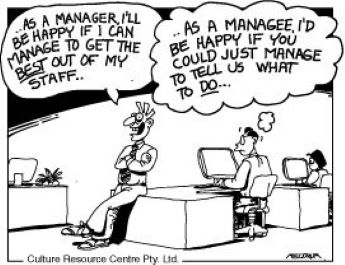Culture@Work
Welcome! My name is Joost Thissen and I am an Interculturalist. Here I share intercultural insights for those of us who work in culturally diverse and global workplaces.


Welcome! My name is Joost Thissen and I am an Interculturalist. Here I share intercultural insights for those of us who work in culturally diverse and global workplaces.


cultural column  Email This Post
Email This Post
When you ask managers to describe expectations of manager behaviour across cultures, you often get different answers from managers from different cultures. According to research by Carte and Fox, in Australia, for example, managers have said, “A manager’s job is to get the best out of his/her people.” In India, when groups of managers where asked the same question, managers replied, “A manager’s job is to tell people what to do.” With variations, the Australian opinion is often shared by Anglo cultures, and the Indian opinion is shared across a number of Asian countries.
Categorising cultures and behaviour need to be a careful exercise that should enables us to reduce complexity and unpredictability across cultures based on research, not by bluntly stereotyping a group of people.
According to the literature, in international business one of the most influential value dimensions used to differentiate between culture is how people deal with power, hierarchy and status. In some cultures, people are comfortable with the fact that regardless of their level of power, people can have equal influence – so called egalitarian orientation or small power distance cultures -. Australia tends to have a more egalitarian orientation: a manager is often seen as the coach for a group of people. In other cultures, people accept that power is spread unequally – so called hierarchical orientation or large power distance -. In India people tend to have a more hierarchical approach where a manager is the defining authority.
Cultural knowledge based on in-depth research equips us in re-aligning work practices to better manage people from different cultures, however personal preferences and specific work situations sometimes contradict existing cultural categories. We therefore think it is imperative to provide people with an opportunity to self-assess their personal preferences about certain ways of working. This allows them to compare their personal preference and work situation with research about national cultural background – thus reflecting on personality, organisational culture, and national cultural background.
Over the past 20 years, we at the Culture Resource Centre have analysed participants’ and students’ self-assessments into personal preferences in our training workshops and via MBA lecture positions in Australia. We noticed that a majority of participants who were raised and educated for most of their childhood in a hierarchical culture, assess themselves (personal preference) as more hierarchical on work-related statements. These participants expect that employees have clearly defined fields of authority, and that a manager makes decisions, balanced by close guidance and control.
We have also investigated what type of cultural challenges managers identified (as indicated by them via our on-line training needs analysis tools):
While exploring different expectations of managers’ behaviour across cultures, it is important for managers to firstly understand their own preference for either egalitarian or hierarchical orientation: the literature indicates that a managers’ egalitarian or hierarchical cultural background might very well influence how that manager prefers to manage his or her staff. Secondly, the manager needs to understand their staff preferences. People do not easily change their values over time – even when they have migrated to Australia, studied abroad, or worked in a foreign country. Most people still feel more comfortable with the egalitarian or hierarchical values with which they grew up, and if their current workplace reflects a different management style this can create challenges due to different cultural expectations.
To be truly effective, managers of culturally diverse teams need to apply intercultural competence to be able to identify, recognise and understand the differences in egalitarian and hierarchical values for both themselves and their staff. Management cannot in all fairness expect their culturally diverse staff to change their basic assumptions and values overnight. They can however ask their culturally diverse staff to agree upon and synergised work practices that facilitates behaviour in building trust, dealing with conflict, showing commitment and taking accountability to focus on commonly defined goals and collective outcomes. Managers are therefore advised to develop intercultural leadership competence and skills which enables them to re-align work practices in culturally diverse teams.
_________________________________________
Joost Thissen, Partner & Interculturalist
joost@cultureresourcecentre.com.au
cultural column  Email This Post
Email This Post